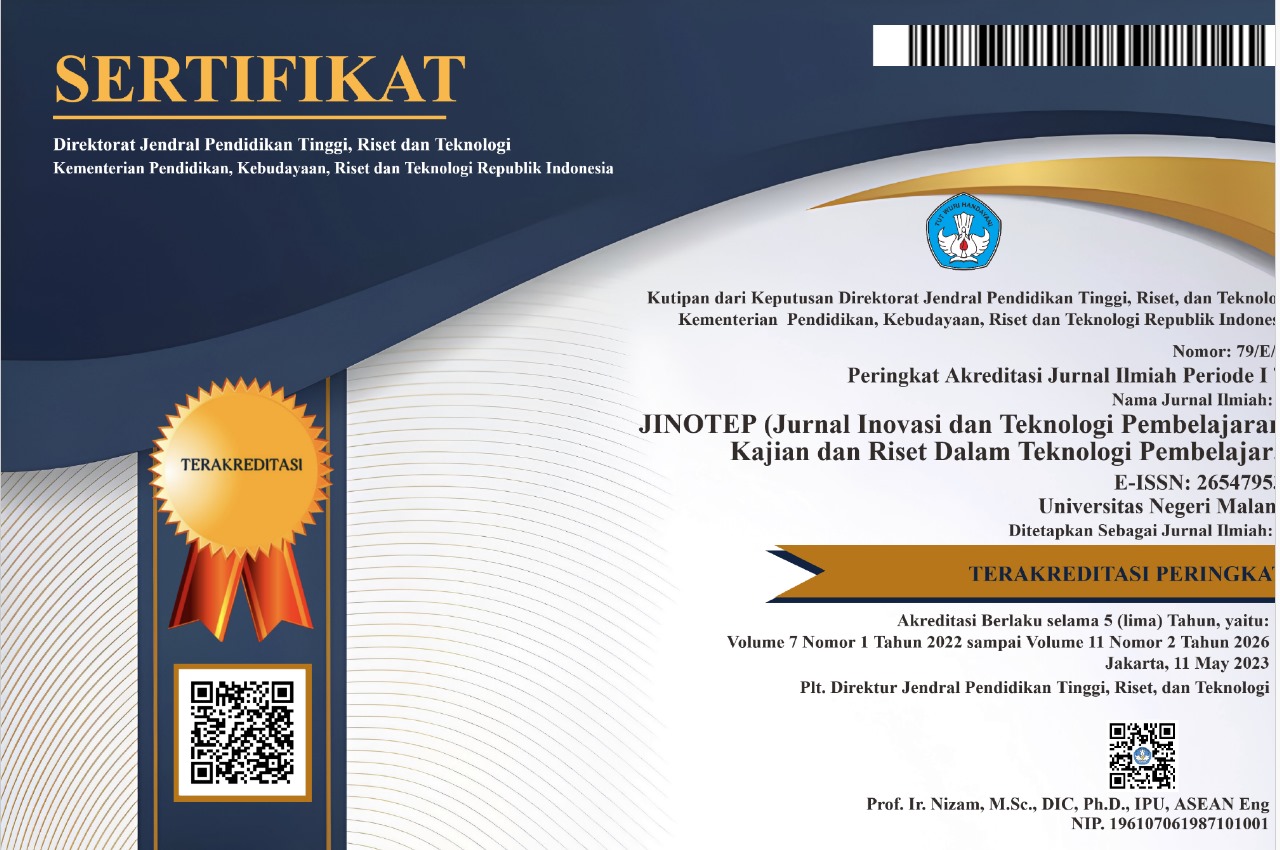Pembelajaran Daring Menggunakan E-Modul pada Flipped Classroom Statistika untuk Meningkatkan Kemampuan Bernalar dan Intensi Berwirausaha
Abstract
Abstrak: Pandemi Covid-19 telah mendorong penerapan pembelajaran jarak jauh. Penelitian ini menerapkan flipped classroom pada pembelajaran daring mata kuliah statistika untuk menyelidiki pengaruhnya terhadap kemampuan bernalar dan intensi berwirausaha mahasiswa. Sesi tatap muka flipped classroom dilakukan secara daring dan sesi luar kelas menggunakan e-modul. Penelitian ini berbentuk eksperimen kepada 56 sampel mahasiswa kelas statistika yang dipilih secara acak di Fakultas Sains dan Teknologi Universitas Prisma. Instrumen menggunakan tes tertulis untuk mengukur kemampuan bernalar dan kuesioner untuk mengukur intensi berwirausaha. Uji statistik t dua sampel dan uji t berpasangan digunakan dalam penelitian ini. Hasil penelitian menunjukkan ada pengaruh positif penerapan flipped classroom dengan dukungan e-modul pada pembelajaran daring statistika terhadap kemampuan bernalar dan intensi berwirausaha mahasiswa.
Abstract: The Covid-19 pandemic has compelled the implementation of distance learning. This study applied the flipped classroom in online learning of statistics courses to investigate its effect on students’ reasoning ability and entrepreneurial intention. In-class sessions of the flipped classroom were conducted online and out-class sessions using e-modules. This study was an experiment with 56 samples of students in the statistics classes who were randomly selected at the Faculty of Science and Technology, Prisma University. Instruments were a written test to measure reasoning ability and a questionnaire to measure entrepreneurial intentions. Statistics test of two-sample t and paired-t were used in this study. The results showed that there was a positive effect of the flipped classroom in online learning of statistics courses with e-module support toward students' reasoning abilities and their entrepreneurial intentions.
Keywords
Full Text:
PDFReferences
Abeysekera, L., & Dawson, P. (2015). Motivation and cognitive load in the flipped classroom: definition, rationale and a call for research. Higher Education Research and Development, 34(1), 1–14. https://doi.org/10.1080/07294360.2014.934336
Agarwal, H., & Pandey, G. N. (2013). Impact of E-Learning in Education. International Journal of Science and Research.
Albalawi, A. S. (2018). The Effect of Using Flipped Classroom in Teaching Calculus on Students’ Achievements at University of Tabuk. International Journal of Research in Education and Science, 198–207. https://doi.org/10.21890/ijres.383137
Awan, N., & Ahmad, N. (2018). Intentions to Become an Entrepreneur: Survey From University Students of Karachi. SSRN Electronic Journal, (September). https://doi.org/10.2139/ssrn.3037459
Bergmann, J., & Sams, A. (2014). Flip Your Classroom Reach Every Student in Every Class Every Day. Get Abstract Compressed Knowledge. https://doi.org/10.1111/teth.12165
Bronkhorst, H., Roorda, G., Suhre, C., & Goedhart, M. (2020). Logical Reasoning in Formal and Everyday Reasoning Tasks. International Journal of Science and Mathematics Education, 18(8), 1673–1694. https://doi.org/10.1007/s10763-019-10039-8
Campos, C., Ferreira, D., Jacobini, O., & Wodewotzki, M. (2015). Mathematical Modelling in Education Research and Practice. Cultural , Social and Cognitive Influences (G. A. Stillman, W. Blum, & M. S. Biembengut, Eds.). Springer US.
Fadlurreja, R., Dewi, N., R., & Ridlo, S. (2019). Kemampuan Penalaran Matematis Siswa melalui Model Pembelajaran PACE. PRISMA, Prosiding Seminar Nasional Matematika, 2, 616–621.
Gallagher, K. S. (2020). Supporting online learning in a time of pandemic. Retrieved from https://rossier.usc.edu/files/2020/04/report-supporting-online-learning-during-pandemic.pdf
Greener, S. (2020). Attendance and attention. Interactive Learning Environments, 28(1), 1–2. https://doi.org/10.1080/10494820.2020.1712105
Hahessy, S., Burke, E., Byrne, E., Farrelly, F., Kelly, M., Mooney, B., & Meskell, P. (2014). Indicators of Student Satisfaction in Postgraduate Blended Learning Programmes: Key Messages from A Survey Study. AISHE-J - The All Ireland Journal of Teaching and Learning in Higher Education, Volume 6(3).
Hal, T., Masta, N., Lumbantobing, S. S., Guswantoro, T., & Daniaty, N. (2020). Mempersiapkan Blended Learning Melalui Pelatihan Pembuatan E-Modul untuk Guru Madrasah Tsanawiyah YAPPI Mulusan. Jurnal Comunita Servizio, 2(1), 265–281.
Hendarman. (2011). Kajian Kebijakan PMW (Program Mahasiswa Wirausaha). Jurnal Pendidikan Dan Kebudayaan, 17(6), 635. https://doi.org/10.24832/jpnk.v17i6.55
Maryati, I. (2017). Peningkatan Kemampuan Penalaran Statistis Siswa Sekolah Menengah Pertama Melalui Pembelajran Kontekstual. Mosharafa, 6, 129–140.
Moriano, J. A., Gorgievski, M., Laguna, M., Stephan, U., & Zarafshani, K. (2012). A Cross-Cultural Approach to Understanding Entrepreneurial Intention. Journal of Career Development, 39(2), 162–185. https://doi.org/10.1177/0894845310384481
Mulyati, S. (2018). Pengaruh Kemampuan Bernalar dan Penguasaan Kosakata terhadap Kemampuan Menulis Karangan Argumentasi. Jurnal Pendidikan Bahasa Indonesia, 1(1), 67–81.
Murdaningsih, D. (2020). Wirausaha di Indonesia Baru 3 Persen dari Jumlah Penduduk. Retrieved November 21, 2020, from Republika Online, May 30, 2020 website: https://republika.co.id/berita/qb5fb8368/wirausaha-di-indonesia-baru-3-persen-dari-jumlah-penduduk
Negara, H. R. P., Santosa, F. H., & Ibrahim, M. (2019). Mengidentifikasi dan mengembangkan kemampuan penalaran statistis. Journal of Mathematics Education and Science. 5(1), 29–41.
Ningsih, S. (2020). Persepsi Mahasiswa Terhadap Pembelajaran Daring Pada Masa Pandemi Covid-19. JINOTEP (Jurnal Inovasi Dan Teknologi Pembelajaran): Kajian Dan Riset Dalam Teknologi Pembelajaran, 7(2), 124–132. https://doi.org/10.17977/um031v7i22020p124
Nisa, H. A., Wahyu, R., & Putra, Y. (2020). Efektivitas E-Modul dengan Flip Pdf Professional Berbasis Gamifikasi Terhadap Siswa SMP. Jurnal Pendidikan Matematika Raflesia, 05(02), 13–25.
Pinontoan, K. F., & Walean, M. (2020). Pengaruh Flipped Classroom Menggunakan Google Classroom Berbahan Ajar Video Tutorial Pada Mata Kuliah Kalkulus. Edcomtech, 5(2), 51–60.
Prayitno, E., & Masduki, L. R. (2017). Pengembangan Media Blended Learning Dengan Model Flipped Classroom Pada Mata Kuliah Pendidikan Matematika Ii. JIPMat, 1(2), 121–126. https://doi.org/10.26877/jipmat.v1i2.1238
Ramirez, D., Hinojosa, C., & Rodriguez, F. (2014). Advantages and Disadvantages of Flipped Classroom: Stem Students’ Perceptions. Iceri 2014: 7Th International Conference of Education, Research and Innovation. https://doi.org/10.13140/RG.2.1.2430.8965
Rivera, V. M. (2016). Flipped Classrooms: Advantages and Disadvantages From the Perspective of a Practicing Art Teacher (State University of New York at New Paltz). Retrieved from https://dspace.sunyconnect.suny.edu/bitstream/handle/1951/68691/Rivera_Thesis.pdf?sequence=1&isAllowed=y
Rokhmania, F. T., & Kustijono, R. (2017). Efektivitas penggunaan E-Modul berbasis flipped classroom untuk melatih keterampilan berpikir kritis. Seminar Nasional Fisika, (November), 91–96.
Roy, H., Ray, K., Saha, S., & Ghosal, A. K. (2020). A Study on Students ’ Perceptions for Online Zoom-app based Flipped Class Sessions on Anatomy Organised during the Lockdown Period of COVID-19 Epoch. 1–4. https://doi.org/10.7860/JCDR/2020/44869.13797
Sabariah, E. (2020). Olah Data Matematika dan Statistik Sebagai Penunjang Kewirausahaan. Juripol, 3(1), 18–24.
Shi-Chun, D., Ze-Tian, F., & Yi, W. (2014). The Flipped Classroom Advantages and Challenges. https://doi.org/10.2991/emtc-14.2014.3
Singh, S., & Arya, A. (2020). A hybrid flipped-classroom approach for online teaching of biochemistry in developing countries during Covid-19 crisis. International Union of Biochemistry and Molecular Biology, (June), 502–503. https://doi.org/10.1002/bmb.21418
Suarsana, I. M., & Mahayukti, G. A. (2013). Pengembangan E-Modul Berorientasi Pemecahan Masalah Untuk Meningkatkan Keterampilan Berpikir Kritis Mahasiswa. Jurnal Nasional Pendidikan Teknik Informatika (JANAPATI), 2(3), 193. https://doi.org/10.23887/janapati.v2i3.9800
Suhardi, D. (2020, July 5). Flipped Classroom Model: Solusi bagi Pembelajaran Darurat Covid-19. Retrieved November 19, 2020, from Kementerian Pendidikan dan Kebudayaan » Republik Indonesia website: https://www.kemdikbud.go.id/main/blog/2020/07/flipped-classroom-model-solusi-bagi-pembelajaran-darurat-covid19
Suliyanto. (2011). Perbedaan Pandangan Skala Likert Sebagai Skala Ordinal Atau Skala Interval. Prosiding Seminar Nasional Statistika Universitas Diponegoro 2011, 978–979.
Tang, T., Abuhmaid, A. M., Olaimat, M., Oudat, D. M., Aldhaeebi, M., & Bamanger, E. (2020). Efficiency of flipped classroom with online-based teaching under COVID-19. Interactive Learning Environments, 0(0), 1–12. https://doi.org/10.1080/10494820.2020.1817761
Thota, S. (2013). A Suevey Notes on Applications and Importance of Statistics in Various Disciplines. International Journal of Mathematics and Computer Applications Research (IJMCAR), 3(1), 77–82. Retrieved from http://www.tjprc.org/view_archives.php?year=2013&jtype=2&id=45&details=archives
Tsai, T. P., Lin, J., & Lin, L. C. (2018). A flip blended learning approach for ePUB3 eBook-based course design and implementation. Eurasia Journal of Mathematics, Science and Technology Education, 14(1), 123–144. https://doi.org/10.12973/ejmste/79629
Weruin, U. U. (2017). Logika, Penalaran, dan Argumentasi Hukum. Jurnal Konstitusi, 14(2), 374. https://doi.org/10.31078/jk1427
Yaqien, S. H., Raharjo, S. T., & Gutama, A. S. (2018). Kekuatan Mahasiswa Berwirausaha: Kasus Di Universitas Padjadjaran. Share : Social Work Journal, 8(1), 127. https://doi.org/10.24198/share.v8i1.18100
Yusuf, Y. (2017). Konstruksi Penalaran Statistis Pada Statistika Penelitian. Scholaria : Jurnal Pendidikan Dan Kebudayaan, 7(1), 60. https://doi.org/10.24246/j.scholaria.2017.v7.i1.p60-69
DOI: http://dx.doi.org/10.17977/um031v8i12021p001
Refbacks
- There are currently no refbacks.
Copyright (c) 2021 Kinzie Feliciano Pinontoan, Mario Walean, Andreuw Vandy Lengkong

This work is licensed under a Creative Commons Attribution-ShareAlike 4.0 International License.
======================================================================
Jurnal Inovasi dan Teknologi Pembelajaran published by Universitas Negeri Malang in collaboration with the Asosiasi Program Studi Teknologi Pendidikan Indonesia (APS TPI) and Ikatan Profesi Teknologi Pendidikan Indonesia (IPTPI) with a MoU.
Publisher Address:
Educational Technology Laboratorium, Building D5, 1st Floor
Faculty of Education, Universitas Negeri Malang
Semarang St. No. 5, Malang City, East Java Province, Postal Code 65145
Email: jinotep.fip@um.ac.id
======================================================================

JINOTEP is licensed under a Creative Commons Attribution-ShareAlike 4.0 International License.
JINOTEP Statistics (Since July 13th, 2020)



.png)




.png)
1.png)
1.png)
4.png)
2.png)
1.png)
1.png)
.png)


_3.png)





1.png)
.png)